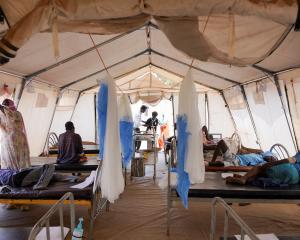"The armed forces and its Supreme Council are committed to handing over power at the scheduled time or even before 30 June," he said.
State television, still controlled by supporters of the old regime, explained that the people who attacked the demonstrators were local residents of the Abbassiya district who had grown sick of continued demonstrations. What could be more understandable than that?
It's so easy to imagine the men of Abbassiya spontaneously rummaging around in their houses for pistols and shotguns, determined to end the nuisance that made it almost impossible to get to the new metro station. Then they gathered at 2am in two separate groups and simultaneously charged the demonstrators from two different directions, as random mobs of disgruntled citizens so often do.
Nine of the 11 dead demonstrators were killed by head shots, a sure sign that amateurs were at work. Only a died-in-the-wool conspiracy theorist would suspect that the attackers were the same old gang of thugs-for-hire that the old regime turned to when it wanted to use deniable but lethal violence on crowds of demonstrators.
Oh, all right then, have it your way. The Supreme Council of the Armed Forces, which has been Egypt's transitional government since the revolution of February 11, 2011, was indeed behind the murders - or at least, some people very close to the SCAF were. That's why the soldiers and police watching all this did not intervene for six hours. So the question is: what did the senior military hope to achieve by doing this?
Partly, they were just being their usual clumsy, brutal selves. But they were also defending their policy of removing all the radicals from the race.
Most of the demonstrators in front of the Defence Ministry were protesting against the disqualification in mid-April of their presidential candidate, Sheikh Hazem Abu Ismail of the Nour Party. He was a frontrunner in the presidential race, two of the others being Khairat al-Shater of the Muslim Brotherhood and the old regime's intelligence chief, Omar Suleiman - both of whom were disqualified too.
The result of the military's machinations is that 10 of the 27 candidates for the presidency have been removed, including all the more extreme ones with any serious prospect of winning the election. The frontrunners among the remaining 13 are two Islamic candidates and two secular ones, none of whom could be called extremists.
Mohammad Morsi of the Muslim Brotherhood, who took the place of the disqualified Khairat al-Shater, has all the charisma of a cabbage.
He may even win fewer votes than Abdel Moneim Aboul Fotouh, a former Brotherhood man who is running as an independent.
On the secular side, is Amr Moussa, a former Egyptian foreign minister and ex-head of the Arab League, and former air force commander Ahmed Shafiq, who was briefly prime minister in the last days of the Mubarak regime.
All moderates.
It's impossible to predict who will win, because the election on May 23-24 will only produce two frontrunners, who will then face a run-off contest in mid-June. What can be said with confidence is that the man the armed forces finally hand power over to at the end of June will not be a radical.
Disappointed?
You wanted Egyptians to conduct a radical political experiment you would never want to see tried in your own country?
Tough.
In 1998 there was a similar nonviolent democratic revolution in another big Muslim country. The dictator who was overthrown, like Hosni Mubarak, was a former general who had ruled his country for more than twenty years. The first elected president was the leader of a prominent Islamic organisation, which frightened the country's 10% Christian minority.
Islamic parties also gained a dominant position in the new Parliament, and the more excitable observers predicted national disaster. However, Indonesia today is a stable democracy with one of the world's fastest-growing economies.
Indonesia is far from perfect.
The military still has enough clout to ensure that "defence" spending stays high, and the police are more corrupt than ever. But the mainstream Islamic parties have stopped demanding sharia law and Muslim-Christian violence has practically ended. The place is a genuine but deeply imperfect democracy - like India, say, or the United States.
Nobody in Indonesia wants the former dictator Suharto back, and already almost nobody in Egypt wants Mr Mubarak back. It will get better in Egypt, though more slowly than most Egyptians hope.
- Gwynne Dyer is an independent London journalist.












